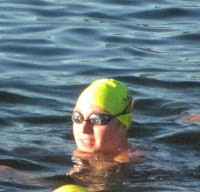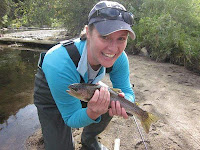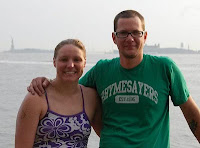 Open water marathon swimmer Sarah Thomas currently resides in Denver, Colorado. Although Colorado is known for the Rocky Mountains and amazing skiing, Denver is home to other marathon swimmers; including Triple Crown and North Channel swimmer Craig Lenning, and Cliff Crozier, who has crossed the Catalina Channel on more than one occasion, and looks to add Lake Tahoe to his credentials. I had the pleasure to train with Sarah last weekend while visiting Denver, and asked her a few questions!
Open water marathon swimmer Sarah Thomas currently resides in Denver, Colorado. Although Colorado is known for the Rocky Mountains and amazing skiing, Denver is home to other marathon swimmers; including Triple Crown and North Channel swimmer Craig Lenning, and Cliff Crozier, who has crossed the Catalina Channel on more than one occasion, and looks to add Lake Tahoe to his credentials. I had the pleasure to train with Sarah last weekend while visiting Denver, and asked her a few questions!
DM: Sarah, this is a big year for you – Tampa Bay in April and the English Channel in July! What are your thoughts on different training this year, versus your past years, with your Catalina Channel and MIMS success?
ST: I plan to use the same training plan for Tampa Bay as I have for MIMS and Catalina. I had good success with both of those swims, and I think the same strategy will work well forTampa Bay. The English Channel is an entirely different swim, which will require a slightly altered training plan. First of all, I am using Tampa Bay as a motivator to get me in the water and to keep my fitness level high during the winter season, when I’m typically less motivated to train. (Pool swimming is hard for me! And Colorado doesn’t have many bodies of water to swim in outside right now.) Since I can trust that my fitness level will be where I want it come the end of April, I can really focus on getting the cold water training in that I know I need for England when the lakes around here cold, and not stress about getting in the massive amount of yardage needed to cross a channel. Once the lakes warm up at the end of May, I can go back to focusing on longer distances. This year, I do plan to get up to the mountains more on the weekends to find some high altitude, cold water lakes to train in to make sure I’m ready for the cold water of the English Channel.
DM: Going for the Triple Crown of Marathon Swimming is a great honor! What does this mean to you, and your dedication to the open water?
 ST: This isn’t something I even knew about 3 years ago, and honestly, it’s not something that I put a huge priority on. I know it’s a great accomplishment, and I’ll be very proud to say that I’ve achieved it, but for me, it’s truly about the swimming. I do swims that interest and challenge me. It just so happens that the first few swims I’ve done are ones that will qualify for the Triple Crown. People keep asking me, “When you finish the English Channel, then what? Isn’t that the hardest swim there is, so won’t you want to retire?” My answer is always the same- there will always be other swims out there that are fun and challenging. I can’t wait to have time to sit and plan beyond 2012. Lake Tahoe and the Strait of Gibraltar are definitely on my bucket list. There is also a lake here in Colorado that a few of us have been contemplating crossing. There are tons of bodies of water out there- I can’t wait to swim in them!
ST: This isn’t something I even knew about 3 years ago, and honestly, it’s not something that I put a huge priority on. I know it’s a great accomplishment, and I’ll be very proud to say that I’ve achieved it, but for me, it’s truly about the swimming. I do swims that interest and challenge me. It just so happens that the first few swims I’ve done are ones that will qualify for the Triple Crown. People keep asking me, “When you finish the English Channel, then what? Isn’t that the hardest swim there is, so won’t you want to retire?” My answer is always the same- there will always be other swims out there that are fun and challenging. I can’t wait to have time to sit and plan beyond 2012. Lake Tahoe and the Strait of Gibraltar are definitely on my bucket list. There is also a lake here in Colorado that a few of us have been contemplating crossing. There are tons of bodies of water out there- I can’t wait to swim in them!
DM: You swim at altitude in Denver, Colorado. Tell us a little more about how you feel this helps endurance athletes to train at altitude, and what it feels like (if you do feel something different) when you come down to sea level for a channel crossing?
ST: I grew up in Texas, at sea level. My first experience with altitude was going to swim meets in Midland, which is a few thousand feet higher, and wondering why we had to adjust our times and why that 500 felt a lot harder all of a sudden. As an adult, when you first move to Denver, you can totally feel the altitude- it’s harder to breath, and you get fatigued a lot more quickly than you do at sea level. There is a ton of literature out there that talks about the pros and cons for living and training at altitude. One article I read says that you get the MOST benefit if you live at altitude and train at sea level because you get the benefit of high altitude, but are able to push your body harder for longer when you train at sea level. So, sometimes, I feel as though living in Denver just neutralizes itself out. We get the benefit of the altitude, with the drawback of not being able to train as hard all the time. However, that being said, it always feels really great to swim at sea level. I always feel lighter and my arms don’t give out on me as soon. It’s a nice feeling, and I love being able to make that transition from 5000 feet to 0 feet. But then again, any opportunity to be in the ocean is always awesome. I love my Colorado lakes, but the ocean is a special place, too!
DM: Dover, and the countryside around the town is very beautiful! Aside from the Channel swim, is there anything in particular you are looking forward to doing while in England, or France?
 ST: We are planning to stay a few extra days after my swim to explore. I know I want to visit London, but honestly haven’t had time to really sit down and plan what I want to do when we get over there. Over the weekend, I did tell my boyfriend that he gets to pick a few places and things he wants to do. I figure if he’s stuck watching me swim for 12 hours, he should be able to do what he wants for a few days. And if that’s the case, we may end up fishing somewhere. I know he’d be thrilled to have a fishing license from England. 🙂
ST: We are planning to stay a few extra days after my swim to explore. I know I want to visit London, but honestly haven’t had time to really sit down and plan what I want to do when we get over there. Over the weekend, I did tell my boyfriend that he gets to pick a few places and things he wants to do. I figure if he’s stuck watching me swim for 12 hours, he should be able to do what he wants for a few days. And if that’s the case, we may end up fishing somewhere. I know he’d be thrilled to have a fishing license from England. 🙂
DM: Lastly, any advice you would give to someone looking to get into our sport? What tips could you offer someone who is used to being a pool swimmer for much of their life?
ST: I was always a pool swimmer growing up. If you’ve been to Texas, most of our lakes are NOT nice to go swimming in, so it never occurred to me to find open water races to do until I moved to Colorado. However, growing up, we did go visit my grandparents cabin every summer on a lake in Oklahoma, and I think that’s where I developed my love for open water swimming. I always wanted to swim to the buoy across the lake, or swim down to the end of the inlet. My poor mother was always having to tell me no- Because, really, you can’t let your 8 year old loose in a heavily trafficked lake. So, even though I didn’t formally start doing open water races until 2007, after I’d been in Colorado for a couple of years, I think I’ve always had that love of open water, without the rules of lane ropes and the chlorine fumes that burn your lungs. For a pool swimmer wanting to make the change, I think you have to have a certain love for chaos and the unknown. I have a few swimmer friends who are really strong, awesome swimmers, but get really freaked out not knowing where they’re going, not being able to see the bottom, worrying about animal life, etc. If that sort of thing really bothers you, then open water swimming isn’t going to be your deal. I love the open sky, the wind and waves, the unpredictability of it. I love swimming in the rain or snow. I love swimming in the dark, at sunrise, at sunset. Without that love, I don’t think you can be successful (or enjoy) the open water. And if you’re looking into adding the next step- getting into marathon swimming, all you need is dedication. You don’t have to be a fast swimmer to do a marathon swim- you just have to be willing to put in the time. If you want to swim really far, you have to be willing to train really far. And you have to be willing to train really far in bad conditions- 86 degree lap pools, rain storms, cold weather, alone. Marathon swimming truly is an “alone” sport. Not many people have any desire to be in the water as long as we need to be, so unless you’re willing to make those commitments and sacrifices and look inside your own dreams and desires, you probably shouldn’t take on marathon swimming. Stick to a 10k. 🙂
THANKS SARAH! I appreciate this, and best of luck with the training!
